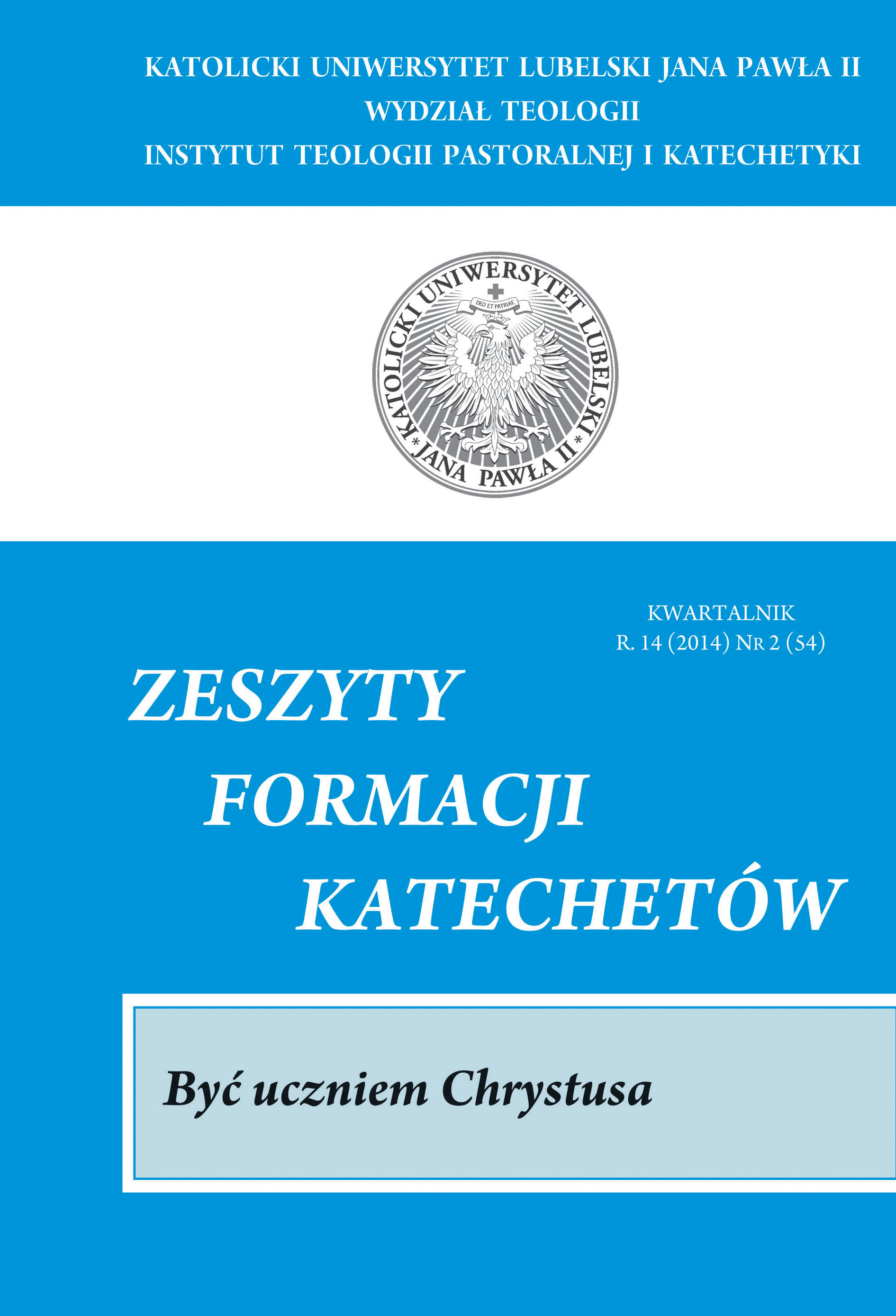Catechesis of the disabled. Basic mistakes and challenges
Keywords:
disabledAbstract
Contemporary catechesis of people with disabilities strives to change them is conceptions about the life of the disabled spread by the media in our country. The ideas about the life of limitations that non-disabled people form on the basis of various messages on TV channels rarely reflect the reality and rarely express our understanding of people with autism or intellectual disabilities. The primary subject of study is, however, the three mistakes that catechists often make. The first mistake is searching for a textbook for catechesis, without realising what adiagnosis of a disabled person means to the catechist. The second mistake is related to the inexplicable decision to reduce the content of the Christian message. The third mistake is the lack of knowledge or understanding of Pope Benedict XVI’s Exhortation Sacramentum Caritatis. The Magisterium of the Church continues to grow and we should skilfully combine the new documents with the old ones, also in the understanding of the canon law. Catechesis does not stop at what was agreed upon in the past. It constantly renews itself as well as its theological and pedagogical foundations by searching for appropriate language and new methods of catechizing, and by creating a modern concept of specialized catechesis. Looking for new ways of reaching people, catechesis is trying to eliminateold habits, individualism and routine, which lead, on the one hand, to apathy, in difference, and other kinds of obstacles, and on the other hand,to reckless improvisation, which brings confusion to the souls ofthe catechized, children and their parents, and becomes the cause of all types of mistakes, too little controlin the classroom, and eventually a complete destruction of unity. The Church, as shedid in the past, is constantly looking for new approaches to catechesis and introduces new rules intothe catechetical process, but is always guided by wisdom, courage and fidelity to the Gospel.
References
Człowiek i autyzm, red. J. Kocki, A. Kiciński, Lublin: Polihymnia 2010.
Człowiek i autyzm. Autyzm i Lubelszczyzna, red. A. Kiciński, Lublin: Gaudium 2010.
Developmental disabilities and sacramental access. New paradigms for sacramental encounters, red. E. Foley, Minnesota 1994.
Jak przygotować młodzież z niepełnosprawnością intelektualną do bierzmowania?, red. K. Sosna. Gniezno: Gaudentinum 2010.
Jan Paweł II, Przemówienie wygłoszone podczas spotkania z osobami starszymi, chorymi i ułomnymi, Wiedeń 11.09.1983 r., w: Ewangelia cierpienia. Wybór homilii, przemówień i dokumentów Jana Pawła II, Kraków 1997.
Jan Paweł II, Przesłanie do uczestników międzynarodowego sympozjum na temat: „Godność i prawa osoby z upośledzeniem umysłowym”, „L’Osservatore Romano”, wyd. polskie, 25 (2004) nr 4.
Jan Paweł II, Spotkanie z chorymi, Terni (Włochy) 19.03.1981 r., w: Ewangelia cierpienia. Wybór homilii, przemówień i dokumentów Jana Pawła II, Kraków 1997.
Katecheza osób szczególnej troski. Stan aktualny, propozycje na przyszłość, red. A. Kiciński, Kraków: WAM 2008.
Kiciński A., Katecheza grup szczególnej troski, „Roczniki Teologiczne” 50 (2003) z. 6.
Kiciński A., Katecheza osób z niepełnosprawnością intelektualną w Polsce po Soborze Watykańskim II, wyd. II, Lublin 2011.
Kiciński A., Katecheza osób z niepełnosprawnością intelektualną. Polskie doświadczenia, „Homo Dei” 78 (2009) nr 4.
Kiciński A., Katecheza przed I Komunią Świętą dziecka upośledzonego umysłowo. Studium przypadku, w: Eucharystia – pokuta i pojednanie w katechezie, red. J. Stala, Kielce 2007.
Kiciński A., Metody pracy z osobami z upośledzeniem umysłowym, w: W poszukiwaniu nowych metod katechetycznych, red. H. Słotwińska, Lublin 2006.
Kiciński A., Niepełnosprawny, w: Encyklopedia katolicka, t. 13 Lublin 2009.
Kiciński A., Niepełnosprawnych intelektualnie duszpasterstwo, w: Leksykon teologii pastoralnej, red. R. Kamiński, Lublin 2006.
Kiciński A., Powołanie katechety specjalnego, w: Katecheza w szkole współczesnej, red. M. Zając, Lublin 2010.
Kielar A.M., Metody katechizacji uczniów z głębszą niepełnosprawnością intelektualną, Poznań 2006.
Kongregacja ds. Duchowieństwa, Dyrektorium ogólne o katechizacji, Città del Vaticano 1997, nr 189.
Lausch K., Wychowanie religijne uczniów głębiej upośledzonych umysłowo, w: Przewodnik dla nauczycieli uczniów upośledzonych umysłowo w stopniu znacznym i umiarkowanym, cz. I, red M. Piszczek, Warszawa 2001.
Löscher W., Świat wokół mnie, Kielce 2002.
Paweł VI, Evangelii nuntiandi. Posynodalna adhortacja apostolska o ewangelizacji w świecie współczesnym, Città del Vaticano 1975.
Piszczek M., Jak można uczyć dziecko z głębokim upośledzeniem umysłowym nowych umiejętności?, w: Edukacja uczniów z głębokim upośledzeniem. Przewodnik dla nauczycieli, Warszawa 2000.
Sękowska Z., Wprowadzenie do pedagogiki specjalnej, Warszawa 1998.
Sosna K., Jak przygotować dziecko z niepełnosprawnością intelektualną do I Komunii Świętej?, Gniezno 2009.
Downloads
Published
How to Cite
Issue
Section
License
Copyright (c) 2014 KATECHISTS' PERIODICAL

This work is licensed under a Creative Commons Attribution-NonCommercial-NoDerivatives 4.0 International License.

